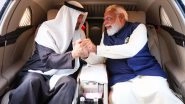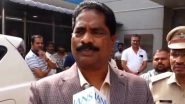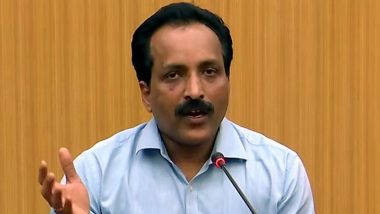Bengaluru, November 12: A recent study by ISRO on whether the money invested in the space agency has benefited the society, found that for every rupee that the organisation spent, the return is Rs 2.50, said ISRO chairman S Somanath on Tuesday.
Somanath was answering a question during the interaction with the students of Karnataka Residential Educational Institutions Society (KREIS), organised by the Social Welfare Department and Science and Technology Department of the Government of Karnataka. ISRO Confident of Making Bhartiya Antriksh Space Station a Launching Point for Lunar Exploration: Dr S. Somanath.
According to him, ISRO's goal was to serve the country rather than to compete for supremacy among the spacefaring nations. To make this happen, ISRO needed freedom to do what it wanted; That freedom could be achieved by creating an ecosystem for business opportunities in space technology, he said.
“Going to the moon is a costly affair. And we cannot depend only on the government for funding. We must create business opportunities. If you have to sustain it, you have to create a use for it. Otherwise, after we do something, the government will tell you to close down,” said Somanath. ISRO Aims To Send Astronauts on Moon by 2040, Says S Somnath on National Space Day (Watch Video).
He also emphasised that ISRO does much more than space exploration. Answering another question, he cited an example of ISRO's project directly benefitting people. “The advisory that we issue to fishermen, for instance, is a good example. With the help of our advisory, they know where to go for the best catch. We use Oceansat to gauge the sea and issue the advisory after studying various parameters. By using this service, the fishermen not just get a good yield of fish, but they also save diesel required for the boats substantially,” said Somanath.
Responding to students who asked about the things that influenced his life, Somnath said that his teachers played a very important role in guiding him. He spoke about his physics teacher Rajappa and maths teacher Paul who were instrumental in him getting not only good grades but also getting a solid grasp of the subject. He also said he would always be grateful to his Class X teacher late Bhagirathiamma, who first told him about IIT and was confident that he would be an engineer one day.
“The only way someone can become great is when the teacher is great,” added Somanath. He also told the students to use the failures as stepping stones. He talked about how his first space project way back in the 1990s, the launch of Polar Satellite Launch Vehicle (PSLV), which was a failure initially due to altitude control problem.
“But the most important thing was that we worked very hard in the next 10 months to set it right and launch it again successfully. I learnt a lot of things from that failure, especially the importance of perseverance,” said Somanath. Later in his life, said Somanath, this experience helped him to keep his faith even in the face of delays. Like in the case of Launch Vehicle Mark-3 or LVM3, for which he gave a project report along with a drawing of the rocket in 2005 and he had to wait for nearly 12 years before it could actually become a reality.
The event saw participation of more than two lakh students and teachers from the KREIS – those who couldn't make it to Bengaluru attended and interacted with Somanath over Zoom. Earlier, H C Mahadevappa, Minister for Social Welfare, kickstarted the event by launching Himalayan Space Lab's live rocket and inaugurating HAM radio base stations.
Speaking at the event, he acknowledged the role of diversity in India's strength and progress. He also recalled the roles of historical figures like Tipu Sultan for pioneering early rocket technology as well as A P J Abdul Kalam for his exceptional contributions to space exploration. Minor Irrigation, Science and Technology Minister N S Boseraju, who gave away telescopes to two residential schools during the event to mark the ambitious telescope distribution project of the Science and Technology Department. According to him, in the first phase 833 residential high school students will benefit from the project. The students also had the opportunity to get information on space technology as well as career opportunities in space technology at the stalls put up by ISRO, Indian Institute of Astrophysics, BSNL, and RYLA (Rotary Youth Leadership Awards) by Rotary.
(The above story is verified and authored by Press Trust of India (PTI) staff. PTI, India’s premier news agency, employs more than 400 journalists and 500 stringers to cover almost every district and small town in India.. The views appearing in the above post do not reflect the opinions of LatestLY)













 Quickly
Quickly


